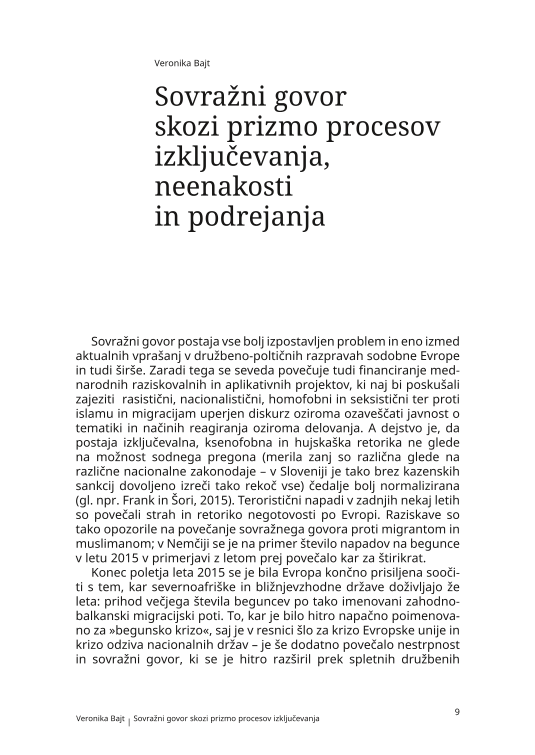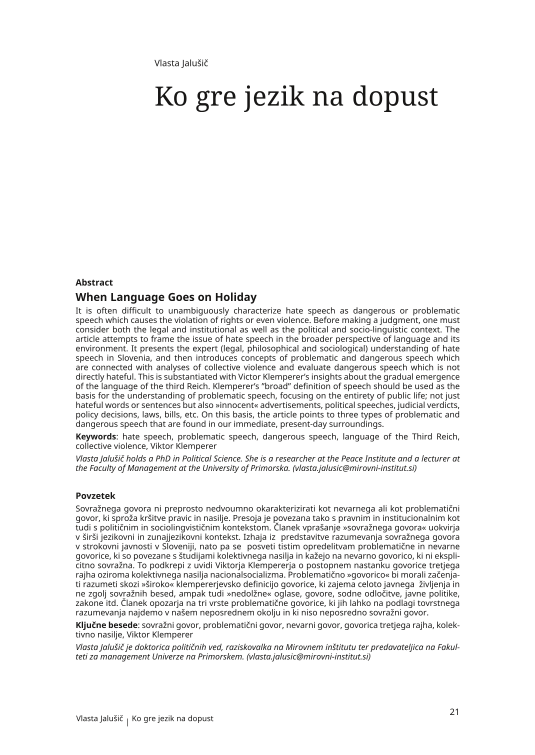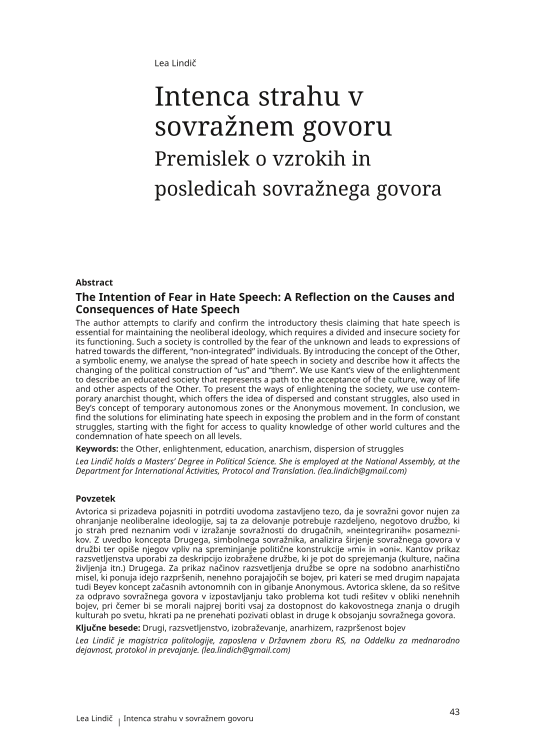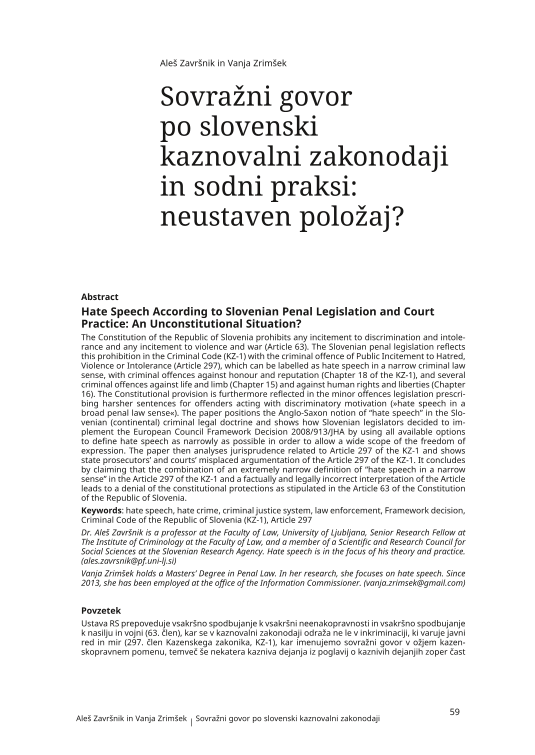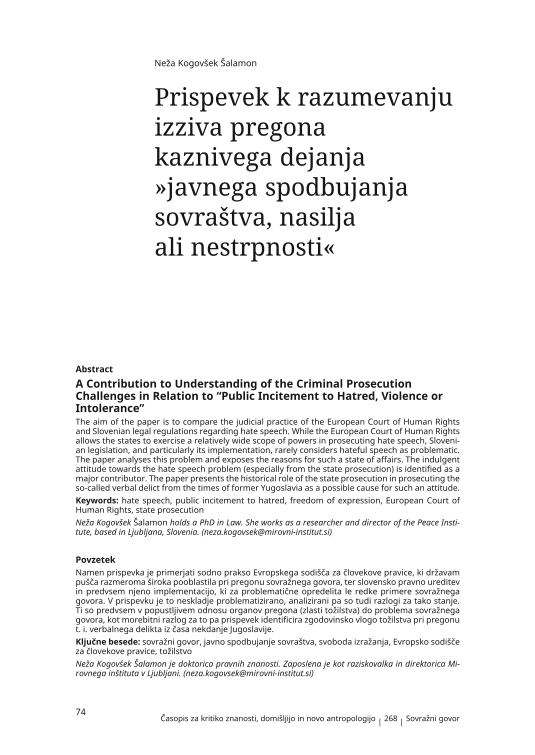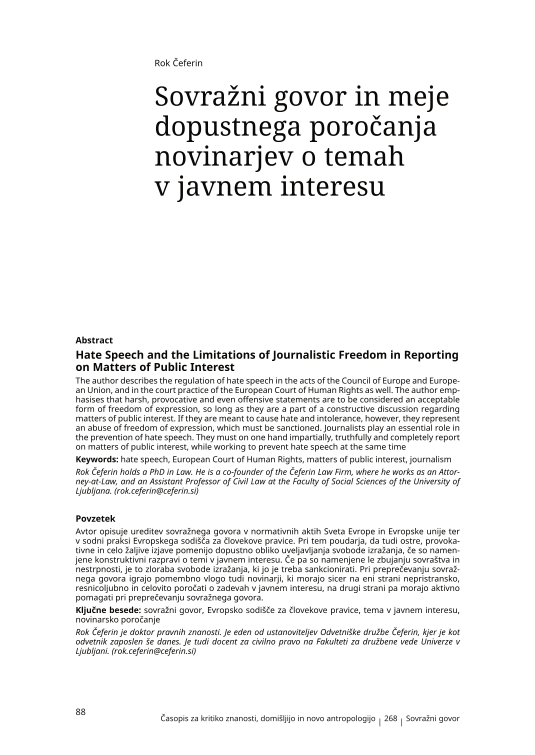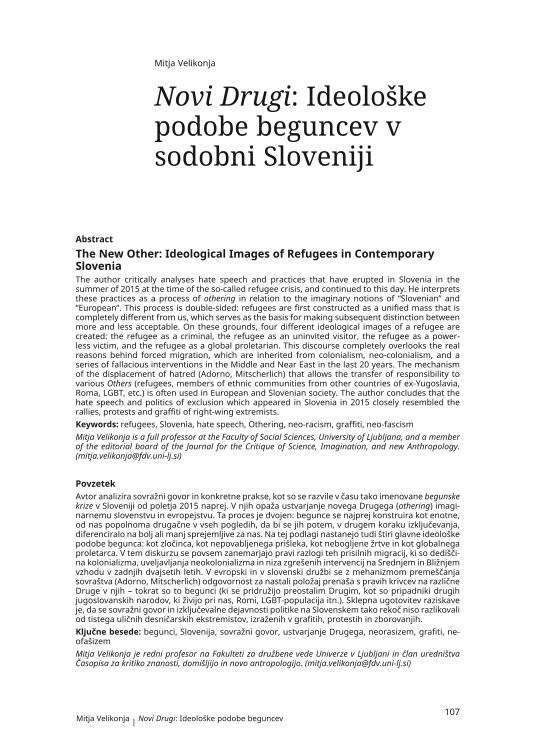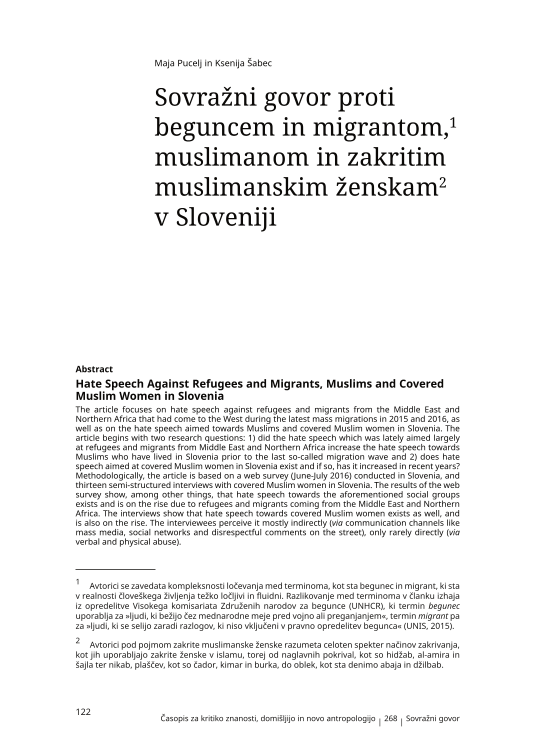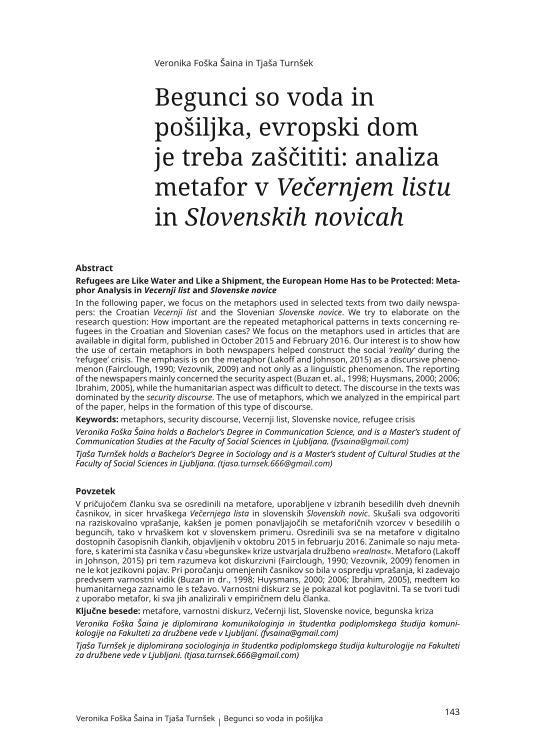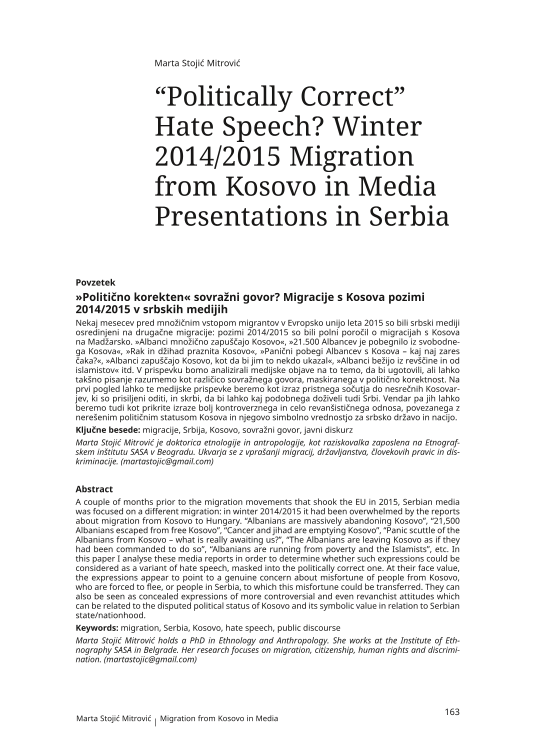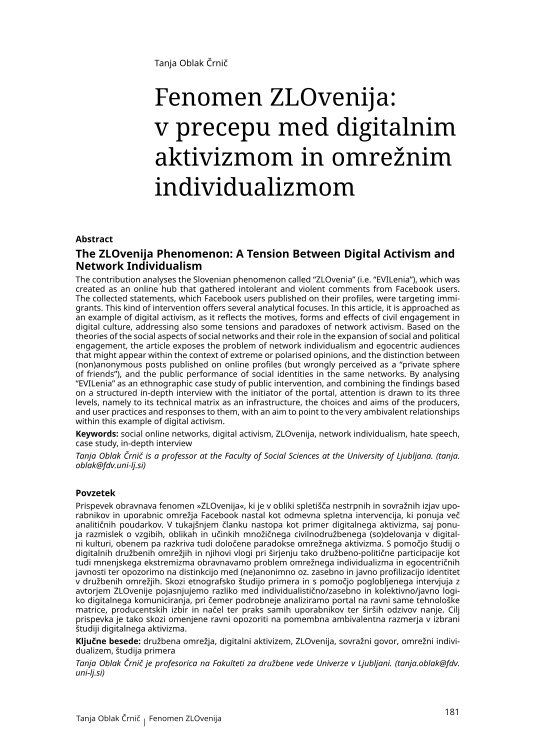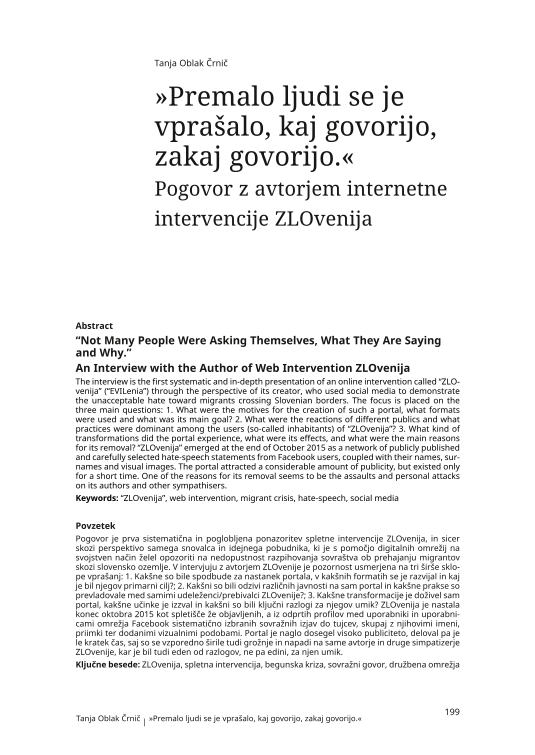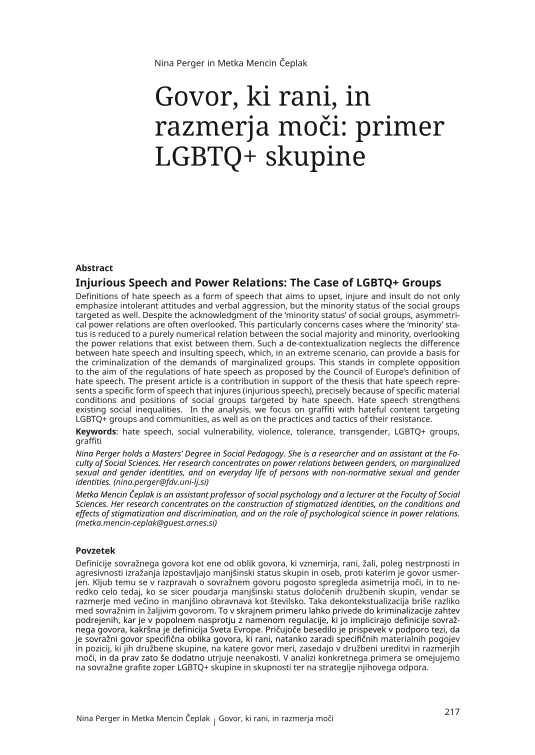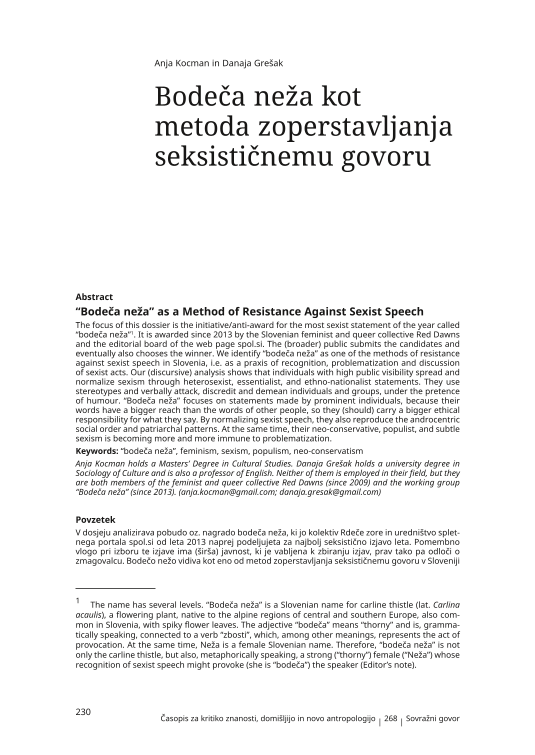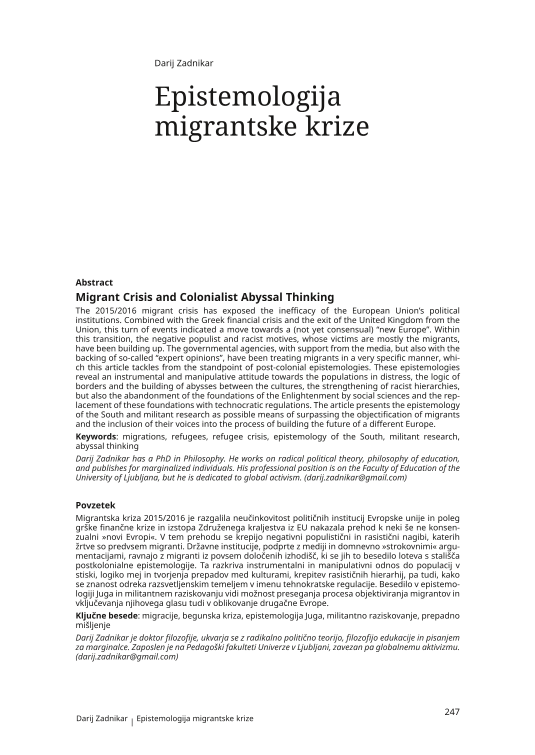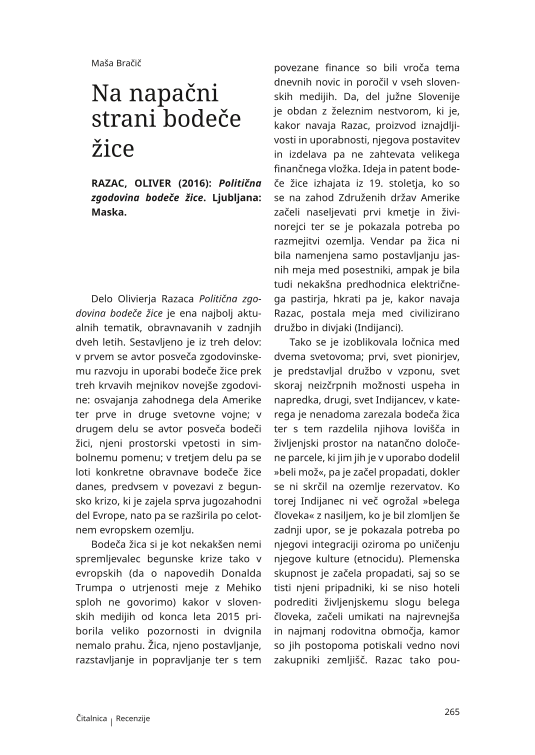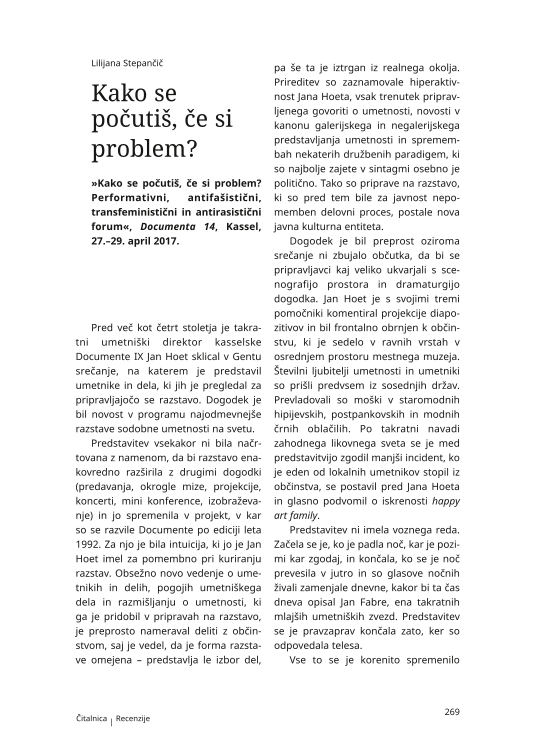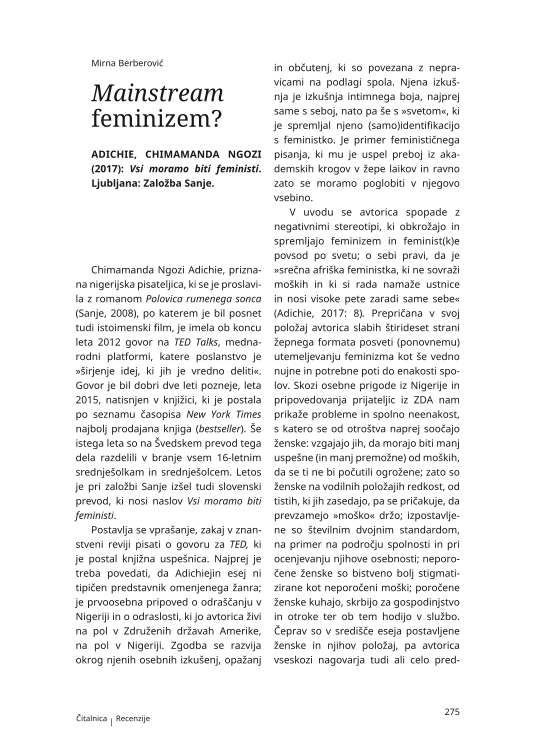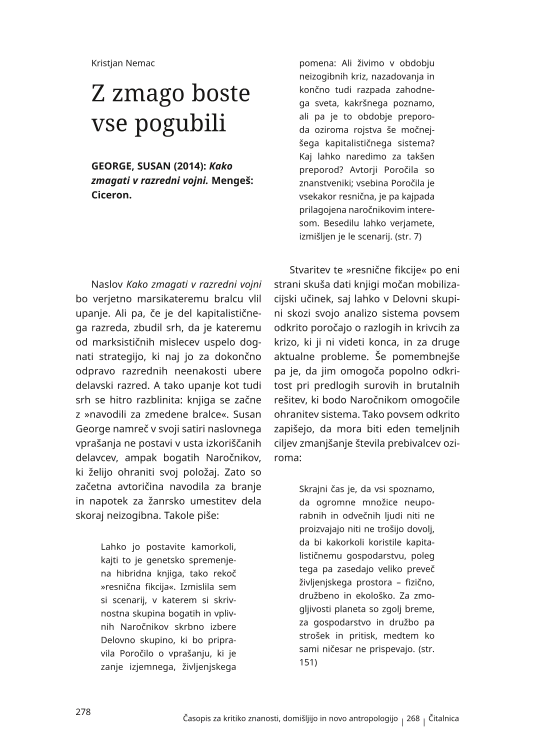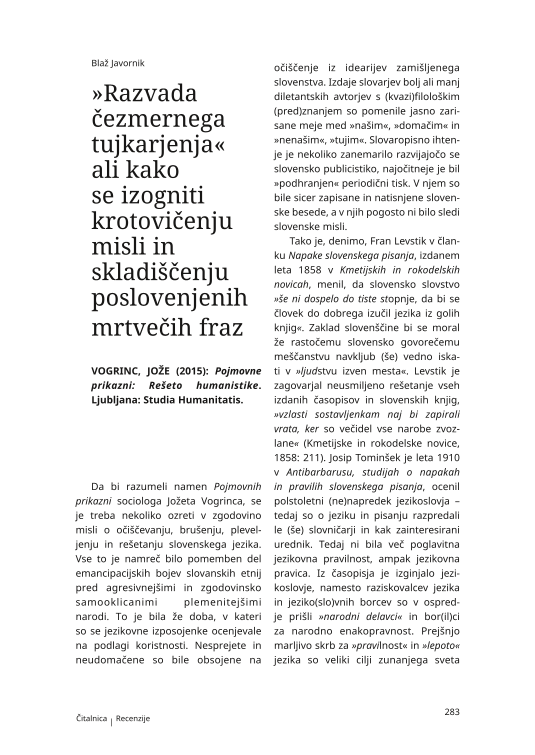Sovražni govor postaja vse bolj izpostavljen problem in eno izmed aktualnih vprašanj v družbeno-poltičnih razpravah sodobne Evrope in tudi širše. Zaradi tega se seveda povečuje tudi financiranje mednarodnih raziskovalnih in aplikativnih projektov, ki naj bi poskušali zajeziti rasistični, nacionalistični, homofobni in seksistični ter proti islamu in migracijam uperjen diskurz oziroma ozaveščati javnost o tematiki in načinih reagiranja oziroma delovanja. A dejstvo je, da postaja izključevalna, ksenofobna in hujskaška retorika ne glede na možnost sodnega pregona (merila zanj so različna glede na različne nacionalne zakonodaje – v Sloveniji je tako brez kazenskih sankcij dovoljeno izreči tako rekoč vse) čedalje bolj normalizirana (gl. npr. Frank in Šori, 2015). Teroristični napadi v zadnjih nekaj letih so povečali strah in retoriko negotovosti po Evropi. Raziskave so tako opozorile na povečanje sovražnega govora proti migrantom in muslimanom; v Nemčiji se je na primer število napadov na begunce v letu 2015 v primerjavi z letom prej povečalo kar za štirikrat.
It is often difficult to unambiguously characterize hate speech as dangerous or problematic speech which causes the violation of rights or even violence. Before making a judgment, one must consider both the legal and institutional as well as the political and socio-linguistic context. The article attempts to frame the issue of hate speech in the broader perspective of language and its environment. It presents the expert (legal, philosophical and sociological) understanding of hate speech in Slovenia, and then introduces concepts of problematic and dangerous speech which are connected with analyses of collective violence and evaluate dangerous speech which is not directly hateful. This is substantiated with Victor Klemperer’s insights about the gradual emergence of the language of the third Reich. Klemperer’s ”broad” definition of speech should be used as the basis for the understanding of problematic speech, focusing on the entirety of public life; not just hateful words or sentences but also »innocent« advertisements, political speeches, judicial verdicts, policy decisions, laws, bills, etc. On this basis, the article points to three types of problematic and dangerous speech that are found in our immediate, present-day surroundings.
The Intention of Fear in Hate Speech: A Reflection on the Causes and Consequences of Hate Speech
(
The author attempts to clarify and confirm the introductory thesis claiming that hate speech is essential for maintaining the neoliberal ideology, which requires a divided and insecure society for its functioning. Such a society is controlled by the fear of the unknown and leads to expressions of hatred towards the different, “non-integrated” individuals. By introducing the concept of the Other, a symbolic enemy, we analyse the spread of hate speech in society and describe how it affects the changing of the political construction of “us” and “them”. We use Kant’s view of the enlightenment to describe an educated society that represents a path to the acceptance of the culture, way of life and other aspects of the Other. To present the ways of enlightening the society, we use contemporary anarchist thought, which offers the idea of dispersed and constant struggles, also used in Bey’s concept of temporary autonomous zones or the Anonymous movement. In conclusion, we find the solutions for eliminating hate speech in exposing the problem and in the form of constant struggles, starting with the fight for access to quality knowledge of other world cultures and the condemnation of hate speech on all levels.
Hate Speech According to Slovenian Penal Legislation and Court Practice: An Unconstitutional Situation?
(
The Constitution of the Republic of Slovenia prohibits any incitement to discrimination and intolerance and any incitement to violence and war (Article 63). The Slovenian penal legislation reflects this prohibition in the Criminal Code (KZ-1) with the criminal offence of Public Incitement to Hatred, Violence or Intolerance (Article 297), which can be labelled as hate speech in a narrow criminal law sense, with criminal offences against honour and reputation (Chapter 18 of the KZ-1), and several criminal offences against life and limb (Chapter 15) and against human rights and liberties (Chapter 16). The Constitutional provision is furthermore reflected in the minor offences legislation prescribing harsher sentences for offenders acting with discriminatory motivation (»hate speech in a broad penal law sense«). The paper positions the Anglo-Saxon notion of “hate speech” in the Slovenian (continental) criminal legal doctrine and shows how Slovenian legislators decided to implement the European Council Framework Decision 2008/913/JHA by using all available options to define hate speech as narrowly as possible in order to allow a wide scope of the freedom of expression. The paper then analyses jurisprudence related to Article 297 of the KZ-1 and shows state prosecutors’ and courts’ misplaced argumentation of the Article 297 of the KZ-1. It concludes by claiming that the combination of an extremely narrow definition of “hate speech in a narrow sense” in the Article 297 of the KZ-1 and a factually and legally incorrect interpretation of the Article leads to a denial of the constitutional protections as stipulated in the Article 63 of the Constitution of the Republic of Slovenia.
The aim of the paper is to compare the judicial practice of the European Court of Human Rights and Slovenian legal regulations regarding hate speech. While the European Court of Human Rights allows the states to exercise a relatively wide scope of powers in prosecuting hate speech, Slovenian legislation, and particularly its implementation, rarely considers hateful speech as problematic. The paper analyses this problem and exposes the reasons for such a state of affairs. The indulgent attitude towards the hate speech problem (especially from the state prosecution) is identified as a major contributor. The paper presents the historical role of the state prosecution in prosecuting the so-called verbal delict from the times of former Yugoslavia as a possible cause for such an attitude.
Hate Speech and the Limitations of Journalistic Freedom in Reporting on Matters of Public Interest
(
The author describes the regulation of hate speech in the acts of the Council of Europe and European Union, and in the court practice of the European Court of Human Rights as well. The author emphasises that harsh, provocative and even offensive statements are to be considered an acceptable form of freedom of expression, so long as they are a part of a constructive discussion regarding matters of public interest. If they are meant to cause hate and intolerance, however, they represent an abuse of freedom of expression, which must be sanctioned. Journalists play an essential role in the prevention of hate speech. They must on one hand impartially, truthfully and completely report on matters of public interest, while working to prevent hate speech at the same time.
The author critically analyses hate speech and practices that have erupted in Slovenia in the summer of 2015 at the time of the so-called refugee crisis, and continued to this day. He interprets these practices as a process of othering in relation to the imaginary notions of “Slovenian” and “European”. This process is double-sided: refugees are first constructed as a unified mass that is completely different from us, which serves as the basis for making subsequent distinction between more and less acceptable. On these grounds, four different ideological images of a refugee are created: the refugee as a criminal, the refugee as an uninvited visitor, the refugee as a powerless victim, and the refugee as a global proletarian. This discourse completely overlooks the real reasons behind forced migration, which are inherited from colonialism, neo-colonialism, and a series of fallacious interventions in the Middle and Near East in the last 20 years. The mechanism of the displacement of hatred (Adorno, Mitscherlich) that allows the transfer of responsibility to various Others (refugees, members of ethnic communities from other countries of ex-Yugoslavia, Roma, LGBT, etc.) is often used in European and Slovenian society. The author concludes that the hate speech and politics of exclusion which appeared in Slovenia in 2015 closely resembled the rallies, protests and graffiti of right-wing extremists.
Hate Speech Against Refugees and Migrants, Muslims and Covered Muslim Women in Slovenia
(
The article focuses on hate speech against refugees and migrants from the Middle East and Northern Africa that had come to the West during the latest mass migrations in 2015 and 2016, as well as on the hate speech aimed towards Muslims and covered Muslim women in Slovenia. The article begins with two research questions: 1) did the hate speech which was lately aimed largely at refugees and migrants from Middle East and Northern Africa increase the hate speech towards Muslims who have lived in Slovenia prior to the last so-called migration wave and 2) does hate speech aimed at covered Muslim women in Slovenia exist and if so, has it increased in recent years? Methodologically, the article is based on a web survey (June-July 2016) conducted in Slovenia, and thirteen semi-structured interviews with covered Muslim women in Slovenia. The results of the web survey show, among other things, that hate speech towards the aforementioned social groups exists and is on the rise due to refugees and migrants coming from the Middle East and Northern Africa. The interviews show that hate speech towards covered Muslim women exists as well, and is also on the rise. The interviewees perceive it mostly indirectly (via communication channels like mass media, social networks and disrespectful comments on the street), only rarely directly (via verbal and physical abuse).
In the following paper, we focus on the metaphors used in selected texts from two daily newspapers: the Croatian Vecernji list and the Slovenian Slovenske novice. We try to elaborate on the research question: How important are the repeated metaphorical patterns in texts concerning refugees in the Croatian and Slovenian cases? We focus on the metaphors used in articles that are available in digital form, published in October 2015 and February 2016. Our interest is to show how the use of certain metaphors in both newspapers helped construct the social ‘reality’ during the ‘refugee’ crisis. The emphasis is on the metaphor (Lakoff and Johnson, 2015) as a discursive phenomenon (Fairclough, 1990; Vezovnik, 2009) and not only as a linguistic phenomenon. The reporting of the newspapers mainly concerned the security aspect (Buzan et. al., 1998; Huysmans, 2000; 2006; Ibrahim, 2005), while the humanitarian aspect was difficult to detect. The discourse in the texts was dominated by the security discourse. The use of metaphors, which we analyzed in the empirical part of the paper, helps in the formation of this type of discourse.
“Politically Correct” Hate Speech? Winter 2014/2015 Migration from Kosovo in Media Presentations in Serbia
(
A couple of months prior to the migration movements that shook the EU in 2015, Serbian media was focused on a different migration: in winter 2014/2015 it had been overwhelmed by the reports about migration from Kosovo to Hungary. “Albanians are massively abandoning Kosovo”, “21,500 Albanians escaped from free Kosovo”, “Cancer and jihad are emptying Kosovo”, “Panic scuttle of the Albanians from Kosovo – what is really awaiting us?”, “The Albanians are leaving Kosovo as if they had been commanded to do so”, “Albanians are running from poverty and the Islamists”, etc. In this paper I analyse these media reports in order to determine whether such expressions could be considered as a variant of hate speech, masked into the politically correct one. At their face value, the expressions appear to point to a genuine concern about misfortune of people from Kosovo, who are forced to flee, or people in Serbia, to which this misfortune could be transferred. They can also be seen as concealed expressions of more controversial and even revanchist attitudes which can be related to the disputed political status of Kosovo and its symbolic value in relation to Serbian state/nationhood.
The ZLOvenija Phenomenon: A Tension Between Digital Activism and Network Individualism
(
The contribution analyses the Slovenian phenomenon called “ZLOvenia” (i.e. “EVILenia”), which was created as an online hub that gathered intolerant and violent comments from Facebook users. The collected statements, which Facebook users published on their profiles, were targeting immigrants. This kind of intervention offers several analytical focuses. In this article, it is approached as an example of digital activism, as it reflects the motives, forms and effects of civil engagement in digital culture, addressing also some tensions and paradoxes of network activism. Based on the theories of the social aspects of social networks and their role in the expansion of social and political engagement, the article exposes the problem of network individualism and egocentric audiences that might appear within the context of extreme or polarised opinions, and the distinction between (non)anonymous posts published on online profiles (but wrongly perceived as a “private sphere of friends”), and the public performance of social identities in the same networks. By analysing “EVILenia” as an ethnographic case study of public intervention, and combining the findings based on a structured in-depth interview with the initiator of the portal, attention is drawn to its three levels, namely to its technical matrix as an infrastructure, the choices and aims of the producers, and user practices and responses to them, with an aim to point to the very ambivalent relationships within this example of digital activism.
The interview is the first systematic and in-depth presentation of an online intervention called “ZLOvenija” (“EVILenia”) through the perspective of its creator, who used social media to demonstrate the unacceptable hate toward migrants crossing Slovenian borders. The focus is placed on the three main questions: 1. What were the motives for the creation of such a portal, what formats were used and what was its main goal? 2. What were the reactions of different publics and what practices were dominant among the users (so-called inhabitants) of “ZLOvenija”? 3. What kind of transformations did the portal experience, what were its effects, and what were the main reasons for its removal? “ZLOvenija” emerged at the end of October 2015 as a network of publicly published and carefully selected hate-speech statements from Facebook users, coupled with their names, surnames and visual images. The portal attracted a considerable amount of publicity, but existed only for a short time. One of the reasons for its removal seems to be the assaults and personal attacks on its authors and other sympathisers.
Definitions of hate speech as a form of speech that aims to upset, injure and insult do not only emphasize intolerant attitudes and verbal aggression, but the minority status of the social groups targeted as well. Despite the acknowledgment of the ‘minority status’ of social groups, asymmetrical power relations are often overlooked. This particularly concerns cases where the ‘minority’ status is reduced to a purely numerical relation between the social majority and minority, overlooking the power relations that exist between them. Such a de-contextualization neglects the difference between hate speech and insulting speech, which, in an extreme scenario, can provide a basis for the criminalization of the demands of marginalized groups. This stands in complete opposition to the aim of the regulations of hate speech as proposed by the Council of Europe’s definition of hate speech. The present article is a contribution in support of the thesis that hate speech represents a specific form of speech that injures (injurious speech), precisely because of specific material conditions and positions of social groups targeted by hate speech. Hate speech strengthens existing social inequalities. In the analysis, we focus on graffiti with hateful content targeting LGBTQ+ groups and communities, as well as on the practices and tactics of their resistance.
The focus of this dossier is the initiative/anti-award for the most sexist statement of the year called “bodeča neža”1. It is awarded since 2013 by the Slovenian feminist and queer collective Red Dawns and the editorial board of the web page spol.si. The (broader) public submits the candidates and eventually also chooses the winner. We identify “bodeča neža” as one of the methods of resistance against sexist speech in Slovenia, i.e. as a praxis of recognition, problematization and discussion of sexist acts. Our (discursive) analysis shows that individuals with high public visibility spread and normalize sexism through heterosexist, essentialist, and ethno-nationalist statements. They use stereotypes and verbally attack, discredit and demean individuals and groups, under the pretence of humour. “Bodeča neža” focuses on statements made by prominent individuals, because their words have a bigger reach than the words of other people, so they (should) carry a bigger ethical responsibility for what they say. By normalizing sexist speech, they also reproduce the androcentric social order and patriarchal patterns. At the same time, their neo-conservative, populist, and subtle sexism is becoming more and more immune to problematization.
The 2015/2016 migrant crisis has exposed the inefficacy of the European Union’s political institutions. Combined with the Greek financial crisis and the exit of the United Kingdom from the Union, this turn of events indicated a move towards a (not yet consensual) “new Europe”. Within this transition, the negative populist and racist motives, whose victims are mostly the migrants, have been building up. The governmental agencies, with support from the media, but also with the backing of so-called “expert opinions”, have been treating migrants in a very specific manner, which this article tackles from the standpoint of post-colonial epistemologies. These epistemologies reveal an instrumental and manipulative attitude towards the populations in distress, the logic of borders and the building of abysses between the cultures, the strengthening of racist hierarchies, but also the abandonment of the foundations of the Enlightenment by social sciences and the replacement of these foundations with technocratic regulations. The article presents the epistemology of the South and militant research as possible means of surpassing the objectification of migrants and the inclusion of their voices into the process of building the future of a different Europe.
RAZAC, OLIVER (2016): Politična zgodovina bodeče žice. Ljubljana: Maska.
Delo Olivierja Razaca Politična zgodovina bodeče žice je ena najbolj aktualnih tematik, obravnavanih v zadnjih dveh letih. Sestavljeno je iz treh delov: v prvem se avtor posveča zgodovinskemu razvoju in uporabi bodeče žice prek treh krvavih mejnikov novejše zgodovine: osvajanja zahodnega dela Amerike ter prve in druge svetovne vojne; v drugem delu se avtor posveča bodeči žici, njeni prostorski vpetosti in simbolnemu pomenu; v tretjem delu pa se loti konkretne obravnave bodeče žice danes, predvsem v povezavi z begunsko krizo, ki je zajela sprva jugozahodni del Evrope, nato pa se razširila po celotnem evropskem ozemlju.
»Kako se počutiš, če si problem? Performativni, antifašistični, transfeministični in antirasistični forum«, Documenta 14, Kassel, 27.–29. april 2017.
Pred več kot četrt stoletja je takratni umetniški direktor kasselske Documente IX Jan Hoet sklical v Gentu srečanje, na katerem je predstavil umetnike in dela, ki jih je pregledal za pripravljajočo se razstavo. Dogodek je bil novost v programu najodmevnejše razstave sodobne umetnosti na svetu.
Predstavitev vsekakor ni bila načrtovana z namenom, da bi razstavo enakovredno razširila z drugimi dogodki (predavanja, okrogle mize, projekcije, koncerti, mini konference, izobraževanje) in jo spremenila v projekt, v kar so se razvile Documente po ediciji leta 1992. Za njo je bila intuicija, ki jo je Jan Hoet imel za pomembno pri kuriranju razstav. Obsežno novo vedenje o umetnikih in delih, pogojih umetniškega dela in razmišljanju o umetnosti, ki ga je pridobil v pripravah na razstavo, je preprosto nameraval deliti z občinstvom, saj je vedel, da je forma razstave omejena – predstavlja le izbor del, pa še ta je iztrgan iz realnega okolja. Prireditev so zaznamovale hiperaktivnost Jana Hoeta, vsak trenutek pripravljenega govoriti o umetnosti, novosti v kanonu galerijskega in negalerijskega predstavljanja umetnosti in spremembah nekaterih družbenih paradigem, ki so najbolje zajete v sintagmi osebno je politično. Tako so priprave na razstavo, ki so pred tem bile za javnost nepomemben delovni proces, postale nova javna kulturna entiteta.
ADICHIE, CHIMAMANDA NGOZI (2017): Vsi moramo biti feministi. Ljubljana: Založba Sanje.
Chimamanda Ngozi Adichie, priznana nigerijska pisateljica, ki se je proslavila z romanom Polovica rumenega sonca (Sanje, 2008), po katerem je bil posnet tudi istoimenski film, je imela ob koncu leta 2012 govor na TED Talks, mednarodni platformi, katere poslanstvo je »širjenje idej, ki jih je vredno deliti«. Govor je bil dobri dve leti pozneje, leta 2015, natisnjen v knjižici, ki je postala po seznamu časopisa New York Times najbolj prodajana knjiga (bestseller). Še istega leta so na Švedskem prevod tega dela razdelili v branje vsem 16-letnim srednješolkam in srednješolcem. Letos je pri založbi Sanje izšel tudi slovenski prevod, ki nosi naslov Vsi moramo biti feministi.
GEORGE, SUSAN (2014): Kako zmagati v razredni vojni. Mengeš: Ciceron.
Naslov Kako zmagati v razredni vojni bo verjetno marsikateremu bralcu vlil upanje. Ali pa, če je del kapitalističnega razreda, zbudil srh, da je kateremu od marksističnih mislecev uspelo dognati strategijo, ki naj jo za dokončno odpravo razrednih neenakosti ubere delavski razred. A tako upanje kot tudi srh se hitro razblinita: knjiga se začne z »navodili za zmedene bralce«. Susan George namreč v svoji satiri naslovnega vprašanja ne postavi v usta izkoriščanih delavcev, ampak bogatih Naročnikov, ki želijo ohraniti svoj položaj. Zato so začetna avtoričina navodila za branje in napotek za žanrsko umestitev dela skoraj neizogibna. Takole piše:
VOGRINC, JOŽE (2015): Pojmovne prikazni: Rešeto humanistike. Ljubljana: Studia Humanitatis.
Da bi razumeli namen Pojmovnih prikazni sociologa Jožeta Vogrinca, se je treba nekoliko ozreti v zgodovino misli o očiščevanju, brušenju, pleveljenju in rešetanju slovenskega jezika. Vse to je namreč bilo pomemben del emancipacijskih bojev slovanskih etnij pred agresivnejšimi in zgodovinsko samooklicanimi plemenitejšimi narodi. To je bila že doba, v kateri so se jezikovne izposojenke ocenjevale na podlagi koristnosti. Nesprejete in neudomačene so bile obsojene na očiščenje iz idearijev zamišljenega slovenstva. Izdaje slovarjev bolj ali manj diletantskih avtorjev s (kvazi)filološkim (pred)znanjem so pomenile jasno zarisane meje med »našim«, »domačim« in »nenašim«, »tujim«. Slovaropisno ihtenje je nekoliko zanemarilo razvijajočo se slovensko publicistiko, najočitneje je bil »podhranjen« periodični tisk. V njem so bile sicer zapisane in natisnjene slovenske besede, a v njih pogosto ni bilo sledi slovenske misli.




